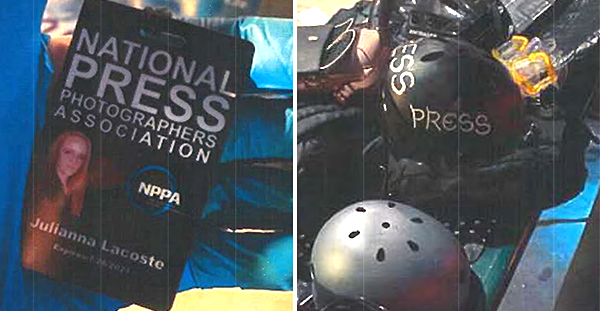
Public access to search warrants provides an important check on police powers. That’s why we went to court to demand the release of warrant materials stemming from the Los Angeles Sheriff’s Department mass arrests of protesters and journalists amid a 2020 demonstration over a deputy’s controversial killing of a Black cyclist named Dijon Kizzee.
After months of litigation and negotiation, our co-counsel, Susan E. Seager, secured the release of the records.
The materials expose the questionable rationale the sheriff’s department used to justify an invasive probe into the digital devices of all arrestees — 17 people rounded up en masse after deputies declared an unlawful assembly, but who were never charged. This targeting of protesters raises significant concerns about chilling the exercise of First Amendment rights.
And the records further confirm that the agency was aware it was targeting two people, Julianna LaCoste and Pablo Unzueta, who identified themselves as journalists, raising press rights concerns. California shield law protections prohibit the use of warrants against journalists.
Deputies photographed LaCoste’s press credential, issued by the National Press Photographers Association, and a helmet that read “PRESS.” Those photos, along with the fact both journalists have said they verbally identified themselves as press, should have put pause on the probe or, at a minimum, prompted the department to make disclosures to the judge to ensure press rights were protected. In addition to California’s strong shield law protections, the U.S. Privacy Protection Act limits when the government can pilfer through protected newsgathering materials. (Unzueta brought a civil rights lawsuit over the ordeal and received a $90,000 settlement.)
The investigator’s statement of probable cause to obtain the warrant allowing invasive searches of browser history, contact lists, messages, photos, GPS data, and more describes signs of rioting and rioters by listing gear commonly carried by anyone attending protests, such as cell phones, gas masks, helmets, vests, and first aid equipment. “Peaceful protesters do not wear gas masks or these types of protective equipment during peaceful protests,” the investigator wrote.,
In response to these revelations, Adam Rose, chair of the L.A. Press Club’s Press Rights Committee, wrote to the sheriff’s department: “Anyone who has observed local protests would know this is a false statement.While rioters use this equipment, so do peaceful protesters — and journalists. Conflating the use of safety gear with criminal intent is something that endangers citizens and chills rights.” (Rose said he has not received a substantive response from the department’s information bureau.)
California law gives the public access to these judicial records, and for good reason. Sunshine on these records keeps us all informed about policing in our communities. And without transparency there can be no accountability.
Read more about this in Knock LA, the independent newsroom that joined us in this fight for transparency. See the unsealed warrant here.
